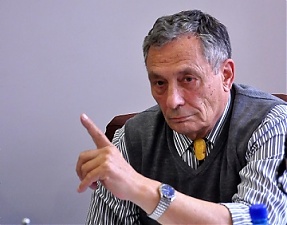Analytics, Economics, Modern EU, Society
International Internet Magazine. Baltic States news & analytics
Saturday, 27.12.2025, 04:28
The voice of European workers: mission of change in EESC
 Print version
Print version |
|---|
| Eugene Eteris. BC. |
The Committee has been struggling for decades to represent workers’
interests in the EU’s decision-making. Although with a consultancy and
coordinating status (so-called “advisory status”), EcoSoc was quite influential in numerous European socio-economic
issues.
It successfully claimed the mantle of European workers and customers’ voice
in Brussels.
Mr. L. Jahier, who’s been in Brussels since 2002 as a member of
the committee, is determined to change the institution’s profile.
Traditionally, it’s been seen as a voice of people at work (two-thirds of the
committee is made up of employer and trade union representatives). Jahier also
wants it known as an EU link to its grassroots. Luca Jahier took over as head
of the European Economic and Social Committee (EESC) from April 2018.
EESC
history and functions
The EESC was set up by the 1957 Rome Treaties to involve economic and
social interest groups in the establishment of the common market and to provide
an institutional structure for briefing the European Commission and the Council
of Ministers on European Community issues.
Note. EESC takes
into account in the conception of the EU common policies the interests of
the various economic and social groups. Its 353 members are proposed by the
governments of the member states.
There are three groups in EESC:
= the Employers' Group (known as "Group I"), which is made up
of representatives of industry, banking or financial institutions, transport
operators' federations, etc.;
= the Workers' Group (known as "Group II"), mainly composed of representatives of trade union organisations; and
= the Various Interests Group
(known as "Group III"), which comprises representatives of
agriculture, skilled trades, small and medium-sized enterprises, the
professions, consumer associations and organisations representing various
interests, such as families or ecological movements.
However,
the members of the Committee are not elected by the corresponding national
groups but are appointed by the governments. There are 6 thematic sectors
including that of EMU, Single Market, energy, transport, agriculture and
employment.
The Committee must be consulted by the Council of Ministers or by
the Commission in certain areas provided for by the Treaty on the functioning
of the EU. The Committee may be consulted by these institutions in all
cases where they consider it appropriate. Furthermore, the EESC may issue an opinion
at its own initiative when it considers such action appropriate (see art. 304
TFEU). Whether they are requested by the Commission or the Council or issued at
its own initiative, the Committee's Opinions are not binding on the
institutions, a shortcoming that weakens their significance.
More in: http://www.europedia.moussis.eu/books/Book_2/2/4/2/3/index.tkl?all=1&pos=42
The EESC fulfils three key missions:
- helping to ensure that European policies and legislation tie in better with economic, social and civic circumstances on the ground, by assisting the European Parliament, Council and European Commission, making use of EESC members' experience and representativeness, dialogue and efforts to secure consensus serving the general interest;
- promoting the development of a more participatory European Union, which is more in touch with popular opinion, by acting as an institutional forum representing, informing, expressing the views of and securing dialogue with organised civil society;
- promoting the values on which European integration is founded and advancing, in Europe and across the world, the cause of democracy and participatory democracy, as well as the role of civil society organisations.
See more in: https://www.eesc.europa.eu/en/about
EESC:
towards more inclusion
Aside from pushing more generally for a “European Renaissance,” including
the in-vogue EU slogan of “empowering and protecting,” he specifically wants
the EESC to be more inclusive.
With Jahier’s election there are now two male Italian former journalists
running EU institutions (the other is the Parliament’s Antonio Tajani). That’s
twice the number of women leading EU institutions (Emily O’Reilly, the EU
Ombudsman, is the only woman).
Jahier is beginning his push by appointing a female chief of staff – Alicja Magdalena Herbowska. He already works with two female vice presidents and a senior team that is majority female.
Mr. Jahier’s underlying argument is that the EU is losing the war of
emotions in the wider world. In struggling to win as many hearts and minds the
EU risks being unable to adapt to its broader political environment. “In
addition to the justice – that women deserve the right to equal opportunities
and an end to the gender pay gap – women are, in general, much more capable to
develop and to put into practice emotional intelligence.
The EESC would like to use more efficiently the enormous reserves of good
energy that women have to help the member states to build a new vision, a new
positive capacity to re-engage in the states’ socio-economic development.








 «The Baltic Course» Is Sold and Stays in Business!
«The Baltic Course» Is Sold and Stays in Business!

